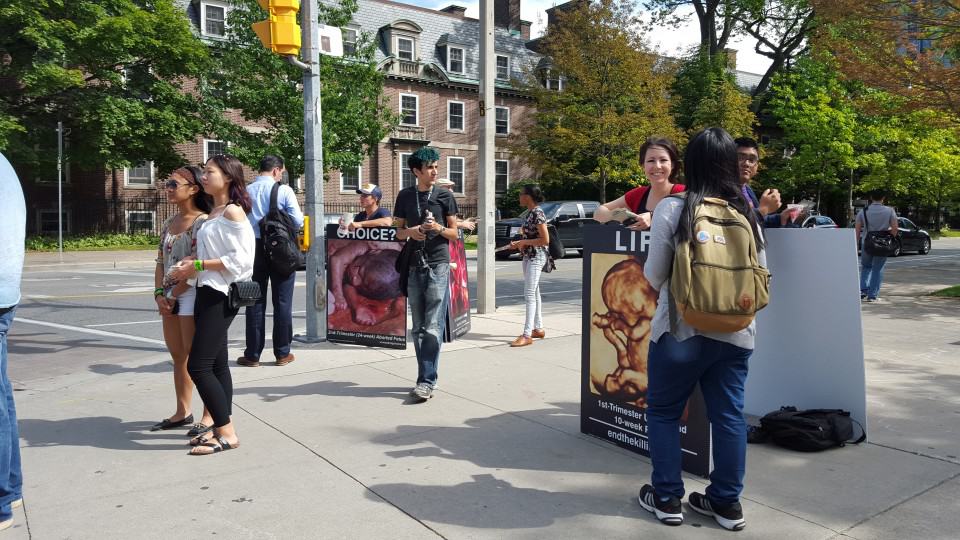Students for Life runs “Choice” Chain to make the injustice of abortion visible to everyone on campus, and to engage them in necessary conversations about the subject. I’m thankful Teodora Pasca has started such a conversation in The Varsity.
Her article dismissed claims about abortion’s negative effects on women. There is, however, scholarship on the subject; the de Veber Institute’s book, Complications: Abortion’s Impact on Women shows correlation between abortion and various physical and mental health problems. For instance, four large-scale data linkage studies cited from the US, the UK, Denmark, and Finland found that induced abortion is actually linked with significantly higher maternal mortality than childbirth.
But even if every claim in that book were proven false, it wouldn’t make a difference for “Choice” Chain.
Abortion isn’t only wrong because it may harm women; abortion is always wrong because it kills another human being.
When does human life begin? From a biological perspective, an organism’s life begins at fertilization. Consider, for instance, U of T’s developmental biology course CSB328H, which uses Scott F. Gilbert’s Developmental Biology. Chapter four of Gilbert’s book states: “Fertilization is the process whereby two sex cells (gametes) fuse together to create a new individual with a genome derived from both parents. Fertilization accomplishes two separate ends: sex (the combining of genes derived from two parents) and reproduction (the creation of a new organism).”
While abortion advocates may argue that a foetus is not a person, it is important to realize our courts have been similarly discriminatory throughout history in labelling some humans as non-persons on the basis of gender, skin colour, or ethnicity. We recognize that logic today as sexist or racist; history has come to judge such denial of personhood as a serious injustice.
Why, then, do we turn a blind eye when our country discriminates based on age? In the Winnipeg Child and Family Services case of 1997, the Supreme Court observed that, “the law of Canada does not recognize the unborn child as a legal person possessing rights.” To say human beings have no rights for the first several months of their lives is ageist.
While some may argue in favour of a woman’s bodily integrity, we cannot forget what abortion does to the other human body in a pregnancy. It becomes hard to argue that bodily integrity justifies abortion when confronted with photos of abortion’s victims, of whom there are about 275 per day in Canada alone. These photos of “blood and guts,” though graphic, are from the Centre for Bio-ethical reform and have been certified by Dr. Anthony Levatino, a physician who has performed hundreds of abortions and testified that the “photos depict aborted human embryos and f[o]etuses.”
In addition, it is incorrect that “the Supreme Court of Canada deemed legal restrictions on abortion unconstitutional.” R. v. Morgentaler clearly states that Section. 1 of the Charter authorizes reasonable limits to a woman’s right to bodily integrity, and that “the precise point in the development of the foetus at which the state’s interest in its protection becomes ‘compelling’ should be left to the informed judgment of the legislature.” In fact, the decision explicitly punts on the question of fetal rights by saying: “The question whether a foetus is covered by the word ‘everyone’ in s. 7 so as to have an independent right to life under that section was not dealt with.”
There is no Charter right to abortion, just the absence of legislation. It is also worth noting there are only three other countries without any legal restrictions on abortion: China, North Korea, and Vietnam. Perhaps not the best human rights club to be in.
There’s no doubt many abortion decisions involve very difficult circumstances, which is why we need authentic solutions. Our club volunteers weekly at a local charity to assist pregnant women, and holds panel discussions between abortion advocates and abolitionists about services for pregnant women. We need to do better than abortion, and kill problems instead of people. Honest, collaborative discussions about abortion are an important first step.
I’m glad Ms. Pasca encouraged people to speak up. I hope everyone on campus has a chance to talk with us – whatever you think about abortion. Abortion is too important an issue to ignore.
Blaise Alleyne has completed a B.Sc. in computer science, English, and philosophy, and is currently a graduate student at Regis College. Blaise is an education coordinator with Students for Life.


